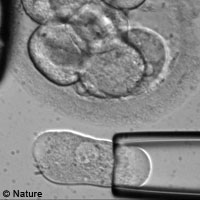US researchers develop techniques for 'ethical' stem cell lines
A team of US researchers believes that it has found a way to develop embryonic stem cell lines without destroying the source embryo. The scientists believe that this breakthrough will enable researchers to get around US president George W Bush's ethical objections, which recently caused the president to exercise his veto for the first time, banning US state funding for embryonic stem cell research. The team from Advanced Cell Technology in Massachusetts was led by Robert Lanza. Their technique adapts an existing procedure - preimplantation genetic diagnosis (PGD) - which is used in IVF treatments to check embryos for genetic defects. 'Until now, embryonic stem cell research has been synonymous with the destruction of human embryos,' said Dr Lanza. 'We have demonstrated, for the first time, that human embryonic stem cells can be generated without interfering with the embryo's potential for life. Overnight culture of a single cell obtained through biopsy allows both PGD and the development of stem-cell lines without affecting the subsequent chances of having a child. To date, over 1,500 healthy children have been born following the use of PGD.' This could present an opportunity for researchers. Leading stem cell researcher Austin Smith, who coordinates the EuroStemCell project, spoke to CORDIS News in July as President Bush exercised his veto, saying that, 'for such important work, people need to work together, and need to get on without political issues around everything.' Clearly Dr Lanza agrees, saying in an interview with Nature that 'the goal here is to generate the lines that everyone would be comfortable with and at least here in the US be eligible for federal funding and there are people who would prefer to use lines that may have been derived without destroying an embryo.' While the findings may appear to overcome ethical objections, some are not so sure. The US legislation bans funding for the 'harm' of embryos, and some may consider the PGD procedure harmful. Others argue that the PGD procedure does not solve the problem at all, because the single cell, or blastocyte, can itself go on to create a child. Not so, says Dr Lanza, who believes that that is simply 'misinformation'. 'Individual cells have never and I repeat never been shown to have the capacity to generate a complete organism in any species, not even in a mouse or a rat,' he said in an interview with the BBC. 'We certainly hope that the Congress and the President will allow this method to be used and thus give this field a badly needed jump-start,' he said. Others still believe that the technique may be simply too invasive, and that the stem cells available from umbilical cord blood may provide a safer, less controversial and cheaper resource than this new PGD technique. There could be significant further debate before the ethical status of embryonic stem cell lines derived from this technique is resolved. PGD is also not without its own risks - it has been known to trigger the loss of an embryo. It is also as yet unknown whether removing a cell at such an early stage of development could be harmful. These questions obviously give rise to a new set of ethical questions. Stem cell research examines the possibilities for using stem cells - undifferentiated cells which can be differentiated into any other cell. Stem cell treatments could in theory be used to treat a number of genetic or degenerative diseases or organ replacement, once techniques are refined.
Countries
United States



